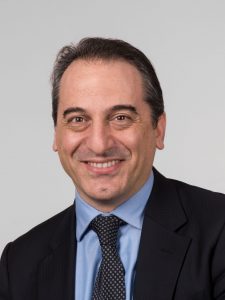
Professor FRANCESCO RUBINO, M.D.
Francesco Rubino is currently Professor of Metabolic and Bariatric Surgery at King’s College London and a Consultant Surgeon at King’s College Hospital in London UK.
His clinical expertise includes laparoscopic bariatric, metabolic and upper digestive surgery. His research interests focus on mechanisms of action of gastrointestinal surgery and the role of the gut in type 2 diabetes.
In 1999 Dr Rubino conceived the idea of re-purposing gastrointestinal and bariatric operations as a treatment for type 2 diabetes itself, introducing the notion of “diabetes surgery” (later published as Rubino F. and Gagner M. “Potential of Surgery for Curing Type 2 Diabetes; Annals of Surgery 2002). Through a series of rodent studies (Rubino et al; Ann Surg 2004 and 2006; Endocrinology 2005) Dr Rubino also provided the first experimental evidence that the anti-diabetes effect of certain bariatric procedures, particularly gastric bypass surgery, results from mechanisms beyond weight loss. These findings revealed a direct mechanistic link between GI surgery and the remission of diabetes and contributed to establish a biological rationale for metabolic/diabetes surgery.
Translational studies by Dr Rubino also identified a specific anti-diabetic mechanism in the exclusion of the duodenum and proximal small bowel from nutrient transit (Rubino et al; Ann Surg 2004 and 2006, Annu Rev Med 2010). These findings have inspired innovative and less invasive approaches that target the duodenum to treat type 2 diabetes and metabolic syndrome such as endoluminal duodenal sleeve devices (i.e. Endobarrier) or duodenal mucosa resurfacing/thermal ablation (i.e. Revita).
He has served as the P.I. and Co-P.I. of randomized clinical trials comparing surgery vs conventional lifestyle/medical therapy for type 2 diabetes (New England J Med 2012; Lancet 2015), contributing to the establishment of level-1 clinical evidence in support of diabetes surgery.
Dr Rubino was the main organizer and co-director of the Diabetes Surgery Summit (DSS-I in 2007 and DSS-II in 2015), an international consensus conference that developed global clinical guidelines for surgical treatment of type 2 diabetes. Recommendations and guidelines from the recent DSS-II have been endorsed by over 50 worldwide organizations including the ASMBS and all major diabetes, endocrinology and surgical societies. In January 2007, the American Diabetes Association (ADA) incorporated DSS recommendations into their Standards of Medical Care, effectively recognizing type 2 diabetes an “operable” disease.
Dr Rubino was also the proponent of the “anti-incretin theory” (Ann Surg 2002; Diabetes Care 2008, Nature Rev Endo 2010; Diabetes 2014; Nature 2016), a theoretical framework that reconciles physiologic mechanisms of glucose homeostasis and the effects of surgery on diabetes. According to the theory, gastrointestinal mechanisms physiologically necessary to defend against insulin-induced post-prandial hypoglycaemia may be inappropriately enhanced by foodborne factors in modern diets, thus resulting in insulin resistance and/or beta cell dysfunction. Reduction of exaggerated anti-incretin signals may explain surgical remission of diabetes. The theory, now supported by a number of independent observations and by emerging experimental evidence (Salinari et al; Diabetes 2017), provides a plausible link between (over)nutrition and insulin resistance and points to the GI tract as a potential target for novel nutritional or pharmacological strategies for the prevention and treatment of obesity and diabetes. In fact, Rubino’s research findings and theories have already inspired biotech industry’s effort to identify gastrointestinal targets for pharmacological intervention (i.e. NGM Biopharmaceuticals).
Dr Rubino received his MD and completed his residency in general surgery at the Catholic University/Policlinico Gemelli in Rome, Italy. He completed fellowships in laparoscopic and minimally invasive surgery at the European Institute of Telesurgery in Strasbourg, France, Mount Sinai Medical Center in New York and at the Cleveland Clinic in Cleveland, Ohio.
In 2013, he was appointed Professor of Metabolic and Bariatric Surgery at King’s College London, as the Institution established the world’s first academic chair in this surgical specialty. Before joining King’s he was Chief of Gastrointestinal Metabolic Surgery and Director of the Diabetes Surgery Center at Weill Cornell Medical College and New York Presbyterian Hospital in New York, USA.
He is the author and co-author of numerous scientific publications, including in prestigious scientific journals such as Nature, New England Journal of Medicine, Lancet, JAMA, Diabetes Care and Annals of Surgery. He has given hundreds of presentations at major scientific conferences and is the recipient of many awards from around the world.
His patients’ stories, research work and patient advocacy efforts have been featured in media such as the New York Times, the BBC, 60 Minutes on CBS, the Wall Street Journal, Newsweek, Time, the Guardian, The Times of London, Scientific American, New Scientist, as well as national TVs and newspapers in many countries